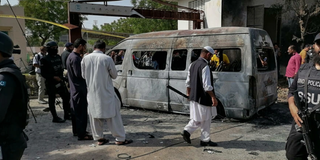Chinese nationals among four killed by woman suicide bomber in Pakistan

A woman suicide bomber from a Pakistan separatist group killed four people, including three Chinese nationals.
A woman suicide bomber from a Pakistan separatist group killed four people, including three Chinese nationals, in an attack on a minibus carrying staff from a Beijing cultural programme at Karachi University on Tuesday.
The Baloch Liberation Army -- one of several groups fighting for independence in Pakistan's biggest province -- claimed responsibility, saying it was their first suicide attack by a woman assailant.
Chinese targets have regularly been attacked by separatists from Balochistan, where Beijing is involved in huge infrastructure projects as part of its Belt and Road Initiative.
CCTV footage broadcast by local channels showed a woman standing near the gate of a Confucius Institute -- the cultural programme that China operates at universities around the world -- as a minibus pulls up.
When the vehicle gets to within a metre she turns her back on it and detonates a bomb strapped to her body.
"We were having a meeting at the dean's office when we heard the deafening blast," said Naeema Saeed, a professor at the university's criminology department.
"It seemed that the roof was falling or the earth was torn. We all rushed outside. We looked around and saw smoke rising."
Baloch separatists have long harboured resentment against lucrative mining and energy projects in the region, saying locals do not see the benefits and are being pushed off their land.
The "Baloch Liberation Army accepts responsibility of today's self-sacrificing attack", the group's spokesman, Jeeyand Baloch, said in a statement published in English on Telegram.
The group released a picture of the woman they said was the bomber, naming her as "Shari Baloch alias Bramsh". She is dressed in military fatigues and a cap, smiling broadly and raising two fingers.
Karachi police confirmed four people had died, including the minibus driver and three staff from the Confucius Institute.
China's embassy in Islamabad said all three citizens killed in the attack were teachers at the institute, and that a fourth had been injured.
It also warned its nationals to pay close attention to security and "not go out unless necessary".
"At the same time", the embassy said in a statement, "all levels in Pakistan are requested to take practical and effective measures to do everything possible to ensure the safety of Chinese citizens, institutions and projects in Pakistan and ensure that similar incidents do not occur again."
Pakistan's new Prime Minister Shehbaz Sharif immediately condemned the attack.
"I am deeply grieved on the loss of precious lives including of our Chinese friends in the heinous attack in Karachi today," he tweeted.
Sharif only took over as premier after Imran Khan was ousted by a no-confidence vote earlier this month, and tackling a resurgence in militancy will be one of his biggest challenges.
"I strongly condemn this cowardly act of terrorism," Sharif said, adding "the perpetrators will surely be brought to justice".
In February, Baloch separatists staged four days of attacks across two locations in the province, killing nine soldiers.
Tensions have flared in recent years in Balochistan following a massive influx of Chinese investment.
China is upgrading energy links and infrastructure as part of a $54 billion programme known as the China-Pakistan Economic Corridor, with both nations wary of security threats to the projects.
In April 2021 a suicide bomb attack at a luxury hotel hosting the Chinese ambassador in Quetta, the provincial capital of Balochistan, killed four and wounded dozens.
The ambassador was unhurt.
In July last year, a bus carrying engineers to a construction site near a dam in northwestern Pakistan was hit by a bomb, killing 13 people including nine Chinese workers.
The attack frayed relations between Islamabad and Beijing, and Pakistan later paid millions in compensation to the families of the Chinese workers killed.
Pakistan's foreign ministry said Tuesday's suicide blast was "a direct attack on... Pakistan-China friendship and ongoing cooperation".
"Pakistan attaches great importance to safety and security of Chinese nationals, projects and institutions in Pakistan," it said in a statement.




